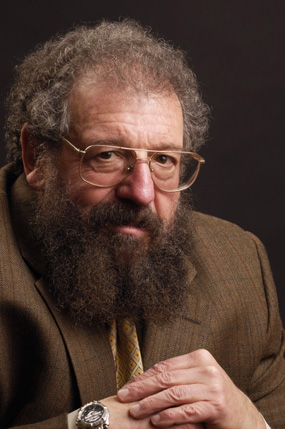Interview with Bernard E. Rollin
Bernard E. Rollin
Bernard E. Rollin, born 1943, is an American philosopher, currently a professor of philosophy, animal sciences, and biomedical sciences at Colorado State University. Rollin specializes in animal rights and the philosophy of conscience. He is the author of numerous articles and several books, including animal rights and human morality; Farm animal welfare: social, bioethical and research issues.
Bernard E. Rollin nacido en 1943, es un filósofo estadounidense, actualmente profesor de filosofía, ciencias animales y ciencias biomédicas en la Universidad Estatal de Colorado. Rollin se especializa en los derechos de los animales y la filosofía de la conciencia. Es autor de numerosos artículos y varios libros, incluidos los derechos de los animales y la moral humana; Bienestar de los animales de granja: cuestiones sociales, bioéticas y de investigación.
What is the most exciting change you have seen in veterinary medicine?Undoubtedly, increased concern for the pain and distress of animals. Historically, these problems were ignored. To this day, too many veterinarians use the term chemical restraint incorrectly as a synonym for anesthesia. Our knowledge of farm animal analgesia is abysmal and far too many procedures are still performed in that area with "bruticaine."Who inspired you the most in your career?Dr. Harry Gorman, past president of the American Veterinary Medical Association, inventor of the artificial hip joint, and a leading veterinarian in the use of animals in the aerospace program. Together he and I developed the world's first course on veterinary medical ethics. He was truly a titanic figure in veterinary medicine.
What was the best career advice you received?
Willard Eddy, the head of the philosophy department who hired me at Colorado State University, told me, "With your personality, you better post a lot!"
What would you advise a recent graduate?
Never stop learning!
What makes a good vet?
A solid foundation of understanding of biological science, a sense of compassion, and the ability to communicate with people. The last item should be highlighted. A veterinarian is in an animal advocacy position where people's skills can make the difference between life and death for an animal.
What book would you recommend?
The awakenings of Oliver Sacks. It is an excellent analysis of the concept of disease. It is aimed at human medicine but it is very relevant to veterinary medicine.
What is the greatest achievement of your career?
Help draft and pass the 1985 amendments to the Animal Welfare Act. These laboratory animal laws prompted the reappropriation of common sense about animal pain and distress in veterinary science and medicine. This legislation, which requires revisions by the Institutional Animal Care and Use Committee, has improved the lives of millions of laboratory animals.
How did you develop your interest in veterinary ethics?
My beginning was a convergence of four factors: teaching at the Colorado State University (CSU) veterinary school; discover the conditions of the animals housed there; an article I wrote on the moral state of animals; and the two people I was able to work with who had 50 years of research experience between them.
I came to CSU in 1969 to teach the history of philosophy. I have always been interested in animals, and in the mid-seventies I wrote an article on the moral state of animals and submitted it to a philosophy magazine. At the same time, I had a locker in the gym with a professor of veterinary pathology and he asked me if I could teach veterinary medical ethics. When I asked him if there was a book to reference, he told me that there were no books, nor was there a field, and that he would start it.
What do you consider to be the greatest threat to the profession?I see two main threats: 1) Not keeping up with social-ethical social welfare concerns, particularly in farm animals; 2) Losing the scientific status of veterinary medicine so hard-won by the obviously baseless appeal of alternative medicine and thereby creating medical anarchy.What animal health needs are currently unmet?Too many animals are uselessly euthanized. If a disease kills as many animals as it is destroyed due to the inability of owners to cope with behavioral problems, there would be a massive effort to eradicate it, but that has not happened.What changes in veterinary medicine do you hope will occur in the next 100 years?Leadership of veterinarians on animal welfare issues.



Comments
Post a Comment